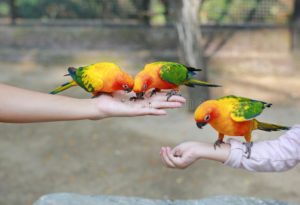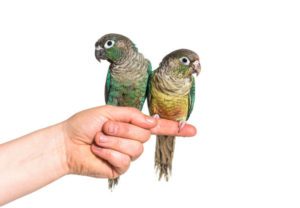National Bird Day
National Bird Day
Happy National Bird Day! At the Veterinary Center for Birds & Exotics, we are fortunate to be able to care for your beloved feathered friends. From parrots to chickens, waterfowl, and backyard birds, we are honored that you have chosen us to care for your companions. With the warmer weather peeking around the corner, it’ an ideal time to address some important bird care topics.
One important bird care topic is proper husbandry at home. Whether you are a new bird owner or you’re adding a new flock member to your family, getting a bird is always exciting , but there are many factors to consider. Having a great relationship with a bird-savvy veterinarian is critical when you adopt a bird.

Bird husbandry topics you should be sure to chat with your veterinarian about during your bird’s initial check-up and at each annual visit:
- Proper diet – proper diet is critical for your bird’s overall health and well-being. Your veterinarian can help you decide on which type of formulated diet is best for your bird.
- A clean environment – it is very important for your bird’s overall health that you keep up with a daily cleaning routine of their enclosure.. Always clean up droppings your bird leaves during the day, and be sure to change the enclosure bedding in
- Always offer fresh water – birds tend to use water for multiple purposes, including drinking and bathing and dipping their food, which often leads to dirty water after time. Refresh their water at least once a day to ensure it stays as clean possible
- A proper sleep schedule – birds need consistency in their sleep routine to maintain a healthy lifestyle. Your bird should get several hours of undisturbed sleep each night, and sleeping time should be consistent each day.
- Clean air – birds have very sensitive respiratory systems. Be sure that none of your household items pose a potential threat to your bird’s health. Common household items that may be deadly to your bird include non-stick cookware, aerosol sprays, essential oils, and household cleaners. Consult with your veterinarian on what household items are safe for your bird, and have an air purifier in any room that your bird spends time in.
- Physical activity and enrichment – all birds need enrichment in their enclosures. Offer a variety of toys to keep their brain stimulated, and work on training routines, such as target training, with your bird to keep them active and interested. .
- Regular bathing – baths are important not only for improving feather quality, but also for maintaining healthy sinuses and skin. Some birds bathe on their own in their own in their water cups, while others don’t like to bathe and need to be spritzed with warm water lightly with a plant mister. Some birds actually like to join their human flock mater in the shower to stay clean. Consult your avian veterinarian about different bathing methods that are most appropriate for your bird.
- Annual vet visits – as prey species that have evolved to hide signs of illness to prevent being eaten by wild predators, birds are masters at disguising underlying health issues. Staying up to date with regular vet visits (at least annually) so that your veterinarian can examine and treat any problems before they become significant is essential.

Conclusion
Having a bird is a joy but also a big responsibility. Being an educated, responsible bird owner is key to having a healthy, long-lived pet. There is so much to know, and having a close relationship with a veterinarian, like those at the Veterinary Center, who specializes in bird care and is available for emergency consultations, is a great way to start off. Our goal at the Veterinary Center is to educate pet owners to help ensure healthy pets. To schedule an examination for your bird so you can be sure you’re doing everything you can to help your bird stay healthy, contact us:
- Our clinic’s landline: 914-864-1414
- Our email: info@avianexoticsvet.com
Recent Posts
Do Ferrets Need Vaccines?
Few of the exotic pet species that we see at The Veterinary Center require vaccinations, but ferrets…
Lead Toxicity in Exotic Pets
Have You Heard About Lead Toxicity? Exposure to lead and other heavy metals can affect multiple body…
Importance of Hydration in Westchester County, NY
With summer temperatures approaching, water is especially essential to your pet’s health. Hydration is needed to regulate…
Why Calcium is Important for Your Reptile in Westchester, NY
Providing a complete and balanced diet is essential when you are keeping any pet. When it comes…
The Importance of Microchipping Your Pet in Westchester County, NY
Do you travel with your bird or other exotic pet? Do you take him or her outside?…
About Veterinary Centers for Birds and Exotics
If you have been looking for specialized care for your bird or exotic pet, look no further! We have you covered. At our unique animal hospital, we provide care to birds and exotics ONLY—no cats and dogs! We are the only bird and exotic veterinary hospital with a full-time, board certified bird specialist, Dr. Laurie Hess. Dr. Hess, who, with her two associates, Dr. Amanda Marino and Dr. Amanda Dewey, are the only full-time veterinarians in Westchester County who are residency-trained in bird and exotic medicine and surgery. Call to schedule an appointment for your pet!

